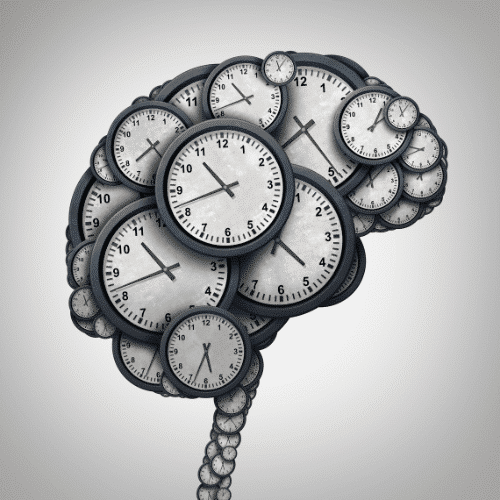Special Report: The Interactive Metronome (IM) and ADHD

By: Amy Vega, MS, CCC-SLP
ADHD and Time Management
National Time Management Month is celebrated during February each year. February is the perfect month to focus on time management skills with your clients. Time management is not as complex or difficult as it seems. When children learn time management early in life, they tend to do so for the rest of their lives. Time management in students helps them achieve their academic and recreational goals. It also teaches them to be independent and productive.
Children diagnosed with Attention-deficit/hyperactivity disorder (ADHD) often have difficulty staying on task and staying organized, all of which can make time management challenging. This is because of the way the brain tends to process things when a person is living with ADHD.
Interactive Metronome Improves Time Management
The human brain measures time continuously. There is increasing evidence that mental timing (aka temporal processing) plays a vital role in many human cognitive, behavioral/social, and motor skills. Research has repeatedly shown that mental timing is impaired in individuals with ADHD. It has also been demonstrated that our mental clock is malleable or changeable, that it can be improved significantly with targeted brain training, such as Interactive Metronome. This special report will explore a few areas where it has been demonstrated that good mental timing is the “key” to better function in individuals with ADHD.
1. Individuals with ADHD demonstrate impaired mental timing.
In 2007, researchers published a paper in the Journal of the American Academy of Child and Adolescent Psychiatry. They reported that “time reproduction [aka mental timing] is deficient in children with attention-deficit/hyperactivity disorder (ADHD).” It is a very interesting study, the first of its kind, to also examine normally developing siblings of those with ADHD.

“Children with ADHD and their nonaffected siblings were less precise than controls, particularly when task difficulty was systematically increased. Time reproduction skills were familial. Time reproduction deficits were more pronounced in younger children with ADHD than in older children.” The last statement is also interesting. We know from Interactive Metronome research that timing does improve as a person ages, so we would expect timing differences to be more pronounced in younger children with ADHD than older ones. Despite this age difference, researchers did find the following to be true:

- Individuals with ADHD demonstrated poor mental timing skills, thus poor ability to estimate time when compared to normally developing children.
- Typically developing (non-affected) siblings ALSO demonstrated poorer mental timing skills than the normally developing children — so the problem with mental timing appears to be familial (or genetic)!!
- Normally developing children demonstrated much more normal & accurate mental timing than those with ADHD and the siblings of those with ADHD.
Mental timing impacts cognitive and behavioral/social skills, so you are likely to see problems in cognitive, academic, and behavioral/social development in persons with ADHD who lack good mental timing skills. The following question also arises from this study: Could siblings of children with ADHD also benefit from brain training for mental timing to give them an academic or competitive advantage?
2. Time-management, a very important life skill, can be improved by addressing an underlying problem in mental timing.
To succeed in school, a child must complete scheduled assignments within specified time frames. Many children with ADHD struggle with the important skill of time management”¦initiating homework on time, setting aside enough time for it, prioritizing assignments to meet deadlines, all while maintaining a busy extracurricular schedule.

Time management involves several neurodevelopmental functions, including attention and temporal-sequential ordering (aka temporal processing or mental timing). According to an article published on All Kinds of Minds (July 21, 2010), “getting started on assignments requires students to engage their attention. Students must be alert to the task at hand, possibly shifting focus to a new activity, and have the mental effort necessary to initiate the task. The ability to preview, or think about the outcomes of a task before beginning, can help students conceptualize what a report will be like once a topic is selected, what materials will be necessary to do an assignment, etc. Previewing is an aspect of attention.”

“Taking the appropriate amount of time for a task involves both temporal-sequential ordering and attention. Temporal-sequential abilities help us understand the order of steps, events, or other sequences; generate products in a meaningful order; and organize work, time, and schedules. These skills are related to a student’s ability to appreciate time in general and estimate time appropriately.”
“Tempo control, a facet of attention, helps students allocate the appropriate amount of time to the task at hand and predict the time required for an upcoming task. Tempo control also instills a sense of “step-wisdom,” the knowledge that it is more effective to undertake activities in a series of steps, rather than all at once. Tempo control allows a student to match his/her pace to the demands of a given task, e.g., to take the right amount of time to finish an essay test, to do a homework assignment thoroughly yet efficiently, etc.”
A student demonstrates good time-management if (s)he:
- Is able to get started on homework assignments, reports, or projects on his own
- Takes an appropriate amount of time to complete the task at hand, such as doing a homework assignment or studying for a test
- Is able to meet deadlines related to schoolwork and follow established schedules
- Comprehends time-related vocabulary (e.g., first, last, when, before, after, next)
A student may be struggling with time management if (s)he:
- Either rushes through work, not taking the time necessary for a thorough job, or takes an excessive amount of time to complete a task/assignment
- Has difficulty meeting deadlines and/or following an established schedule
- Is often tardy, frequently not realizing when he or she is running behind
- Has trouble with long-term assignments
3. Social skills can be improved through brain-training that targets mental timing in order to improve attention, mental speed, and working memory.
Social problems are commonly observed in children with ADHD and reflect a major source of stress and functional impairment for these children. A recent study published in the Journal of Abnormal Child Psychology (2011), for the first time, examined the role of working memory in social interactions in children with ADHD and those demonstrating normal development.

The authors of this study found that impaired social interactions in children with ADHD reflect, to a significant extent, the behavioral outcome of being unable to maintain a focus of attention on information within working memory while simultaneously dividing attention among multiple, on-going events and social cues occurring within the environment.”
What is working memory? Think of it as a small bank in the brain that temporarily holds information so that a person can reply to someone’s comment appropriately, socially interact with someone in a way that is appropriate to the person and context/situation, make a decision, complete a task (i.e., homework). This bank is limited in the amount of information it can hold. It must constantly be updated” tossing old, irrelevant information out while updating with newer, more pertinent information as our environment (people, expressions, dialogue, emotions, actions”) is ever-changing and dynamic.
Some very important things must happen for a person to be able to get information into working memory accurately, hang onto only the information that is important for the task at hand (i.e., interacting with a friend), update the information as things change (i.e., friend changes topic), and tune out distracting, irrelevant information (i.e., paying attention to something that is not relevant to the conversation at hand, therefore missing vital information):

- A person must stay focused (FOCUSED ATTENTION)
- A person must be able to determine what is important to pay attention to (SELECTIVE ATTENTION)
- A person must tune out information that is not important to the task at hand (SELECTIVE ATTENTION)
- A person must be able to keep up with the pace of information and update the temporary memory bank as it changes, in real time “including facial expressions, tone of voice, comments, intent/motive behind comments”. (PROCESSING SPEED)
Focused attention, selective attention, & processing speed (AND ULTIMATELY working memory) are all STRONGLY INFLUENCED by our brain’s clock, or what is known as temporal processing. Just as an orchestra must play separate instruments together in perfect harmony & synchrony for the music to sound good, the brain’s clock must also orchestrate the timing of neural signals from various regions of the brain in perfect harmony & synchrony for a person to function optimally at any task, including in social interactions. Poor timing = poor focus = poor working memory = poor social skills. Good timing = good focus = good working memory = good social skills.
